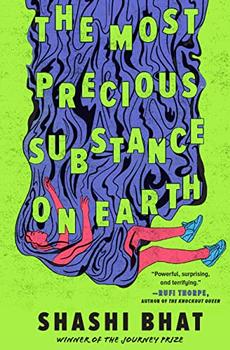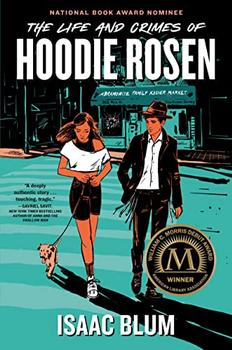Summary | Excerpt | Reviews | Beyond the book | Read-Alikes | Genres & Themes | Author Bio

Think of all the worst parts of puberty — all the moments you partially miss or brood about because they've shaped who you are today. Think of those moments, and push the timeline forward — dating, your first horrific situation at work, an early 30s crisis. Add an Indian-Canadian household in the '90s and a Halifax backdrop, and you have a recipe for Nina. At the age of 14, she muses about her English teacher looking like Jason Bateman on The Hogan Family and goes through a Fairuza Balk phase with her best friend Amy. She also messages pedophiles in private chat rooms in search of sexual validation, and a traumatic event reshapes her forever, fracturing her into pieces that follow her throughout her life. Shashi Bhat's The Most Precious Substance on Earth is a cathartic, witty and unfiltered lens into the life of ordinary and sweet Nina, navigating her identity. Following Nina from high school to her 30s, Bhat asks readers: What happens to the women who stay silent? What if we gave voice to their untold stories?
For someone who feels the need to stay silent, Nina has an incredibly powerful narrative voice. Her humor or naivety can undercut even the most horrific moments of her life. In some instances, these two aspects flirt with each other. While lying in bed with someone who has a crush on her, Nina uses silence and unresponsiveness as a shield: "His hand roves over my hip. I make myself still. I impersonate taxidermy." In this moment, she is clearly uncomfortable, and the striking image — impersonating taxidermy — is distressing because it shows how she freezes up. It also comes with a tinge of dark humor because readers can understand that Nina is pretending to appear lively while feeling dead, something that is unnoticeable to the man next to her. Such a moment is emblematic of how Bhat uses what is not said to draw attention to everything Nina wishes she could say or do. Later in the novel, Nina pours her time into thinking about the past and how she would have rewritten what has already happened in her life. What could she have done differently? How would speaking up in those times of silence have changed her?
In a novel that reflects on key moments throughout a character's life, structure is important in determining its direction. The structure of The Most Precious Substance on Earth was something I both enjoyed and struggled with throughout my reading experience. Bhat's book feels more like a short story collection than a novel, and this is a major factor to take into account when considering whether it would appeal to you.
What I loved about the book regarding its short story presentation is Bhat's economical use of language. Readers quickly get a sense of Nina's personality, what she thinks about and the central conflicts she's experiencing throughout pivotal moments. The novel opens, "I started reading Beowulf about a week ago, not because it was on the syllabus, but because I am in love with my English teacher. I would read anything for him." In two sentences, readers have a sense of the character's age and her devotion to someone she is infatuated with, which sets up the focus for the rest of the chapter.
Bhat encapsulates one monumental moment per chapter. Each feels like a standalone piece of Nina's life, its own story within her universe, linked to others thematically but not necessarily by plot progression. One frustration I had with this structure is that chapters end on threads that I thought the book would circle back to. Instead, anecdotes are left open-ended and we are never really told how the conflicts in them were resolved, if they were resolved at all.
Also, though the overall structure of the novel is very purposeful, Part One and Part Two feel like two different books. Part One is about Nina's high school years, and includes a nuanced portrayal of her friendship with her best friend Amy, while Part Two is about everything else. The only major connection the two parts have is that they follow Nina throughout her micro epiphanies about self-confidence and what it means to find your voice when you've felt silenced. I felt that I was following Nina through these important moments while remaining unclear about where she was going to be by the end, even after reading the entire book. Though the ending partially circles back to the first part, it feels very abrupt and random, as if Bhat is tying a loose end readers weren't looking for.
However, despite these plot-related concerns, I was enamored with Bhat's character-driven portrait of a silenced woman. The novel is a case study in what it means to grow up while girlhood trauma lurks in your past. "For the girls who stay quiet," Bhat writes in her dedication — and what she leaves unsaid is, "You are heard, and you have so much more strength you have yet to discover."
![]() This review was originally published in The BookBrowse Review in August 2022, and has been updated for the
July 2023 edition.
Click here to go to this issue.
This review was originally published in The BookBrowse Review in August 2022, and has been updated for the
July 2023 edition.
Click here to go to this issue.

If you liked The Most Precious Substance on Earth, try these:

by Tony Tulathimutte
Published 2025
From the Whiting and O. Henry–winning author of Private Citizens ("the first great millennial novel," New York Magazine), an electrifying novel-in-stories that follows a cast of intricately linked characters as rejection throws their lives and relationships into chaos.

The Life and Crimes of Hoodie Rosen
by Isaac Blum
Published 2023
The Chosen meets Adam Silvera in this irreverent and timely story of worlds colliding in friendship, betrayal, and hatred.
Your guide toexceptional books
BookBrowse seeks out and recommends the best in contemporary fiction and nonfiction—books that not only engage and entertain but also deepen our understanding of ourselves and the world around us.